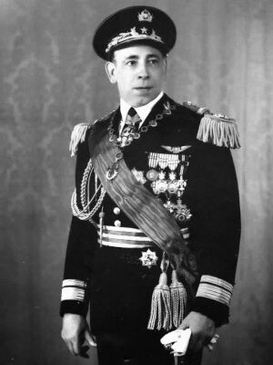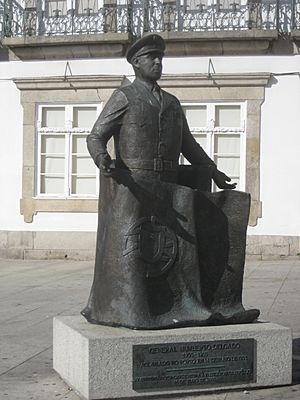Humberto Delgado facts for kids
Quick facts for kids
Humberto Delgado
|
|
|---|---|
 |
|
| Born | 15 May 1906 Torres Novas, Portugal
|
| Died | 13 February 1965 (aged 58) |
| Occupation | Military Diplomat |
| Known for | Founding TAP Air Portugal Attempts to overthrow the Salazar Regime |
| Spouse(s) |
|
| Children | 3 |
Humberto da Silva Delgado (born May 15, 1906 – died February 13, 1965) was a brave General in the Portuguese Air Force. He was also a diplomat and a politician who played a big role in Portugal's history.
| Top - 0-9 A B C D E F G H I J K L M N O P Q R S T U V W X Y Z |
Humberto Delgado's Early Life and Military Career
Humberto Delgado was born in a place called Brogueira, near Torres Novas in Portugal. He was the only son, with three younger sisters named Deolinda, Aida, and Lídia.
He started his military journey at a young age. From 1916 to 1922, he studied at the Colégio Militar in Lisbon. In 1926, he took part in a revolution. This event changed Portugal's government. It led to a new period called the Ditadura Nacional and later the Estado Novo.
At first, Delgado strongly supported this new government. He became very important in civil aviation. He also led groups like the Portuguese Legion. He was the youngest general in Portugal's history. His friend, Marcelo Caetano, once said Delgado was a very passionate person. He always showed his true feelings.
In 1933, Delgado wrote a book. It was called Da Pulhice do 'Homo Sapiens'. In 1941, he even wrote good things about Adolf Hitler. However, as World War II went on, his views changed. He started to support the Allies. He visited the Azores islands during the war. This was part of an agreement between Portugal and Britain.
Founding TAP – Portugal's Airline
Humberto Delgado helped create Portugal's main airline. It was called Transportes Aéreos Portugueses. This happened on March 14, 1945. He was in charge of Civil Aeronautics at the time.
The airline bought its first planes, two DC-3 Dakotas, that same year. On September 19, 1946, the first flight for passengers took off. It flew between Lisbon and Madrid. Later that year, a very long flight started. It connected Lisbon to Luanda in Angola and Lourenço Marques (now Maputo) in Mozambique. This journey had many stops and took 15 days round trip. It was the longest flight in the world for twin-engine planes!
Under Delgado's guidance, the first flight within Portugal began in 1947. It went from Lisbon to Porto. In 1948, TAP joined a big international airline group called IATA. Flights to Paris and Seville also started. In 1949, TAP began flying to London.
Humberto Delgado's Diplomatic Career
In 1952, Humberto Delgado became a military attaché. This meant he worked at the Portuguese Embassy in Washington, D.C.. He also joined a committee for military representatives at NATO.
When he was 47, he became a general. In 1956, the U.S. Government honored him. They gave him the rank of officer of the Legion of Merit.
The 1958 Presidential Election
Living in Washington, D.C., and working with NATO changed Delgado's ideas. He started to believe in liberal democracy. This inspired him to run for President in 1958. He decided to run as an independent candidate. This surprised many people who were against the government.
According to Marshal Costa Gomes, Delgado decided to run because he didn't get a job he wanted at the NATO Defense College. Delgado had a habit of making jokes about a British admiral. These jokes upset the admiral. The admiral then stopped Delgado from getting the job. Costa Gomes said Delgado was smart but a bit "senseless." This earned Delgado the nickname "General sem juizo" (The senseless general).
The current president, Craveiro Lopes, was forced to step down by the leader, Salazar. So, Delgado ran against Américo Tomás, who was Salazar's chosen candidate.
Delgado campaigned very hard. Even though the election system was unfair, he kept going. The government's party, the National Union, always won.
On May 10, 1958, Delgado was asked what he would do about Salazar. He famously replied, "Obviamente, demito-o!" ("Obviously, I'll sack him!"). He knew the president could remove the prime minister. This was the only way to challenge Salazar's power.
His bold statement earned him another nickname: "General sem Medo" ("Fearless General"). A large crowd came to his rally in Oporto. But when he tried to go back to Lisbon, the police stopped him. They also broke up a planned gathering.
In the end, Delgado officially received less than 25% of the votes. Tomás won with 76.4%. Salazar did not let people from the opposition watch the vote count. Many believed Delgado might have won if the election had been fair. Salazar was worried enough that he changed the rules. After this, the president was chosen by the legislature, which Salazar controlled. Delgado was the only opposition candidate who stayed in the race until election day during the Estado Novo period.
Exile and Opposition (1958–1965)
After the election, Delgado was removed from the Portuguese military. He found safety in the Brazilian embassy. Then he went into exile, living mostly in Brazil and later in Algeria. While in Brazil, he received help from Maria Pia de Saxe-Coburgo e Bragança. She was a claimant to the Portuguese Throne. She gave him money and even offered him a home in Rome.
In 1964, he started the Portuguese National Liberation Front in Rome. He publicly stated that the only way to end the Estado Novo was through a military coup. A military coup is when the army takes control of the government by force. Many others thought a national uprising was better.
Assassination
On February 13, 1965, Humberto Delgado and his secretary, Arajaryr Moreira de Campos, were tricked into an ambush. This happened near the Spanish border town of Olivenza. The secret police of the regime, called PIDE, murdered them. They were trying to secretly enter Portugal. Their bodies were found about two months later. They were near the Spanish village of Villanueva del Fresno.
Honours
Humberto Delgado received many awards and recognitions for his service.
National Honours
 Officer of the Order of Aviz, Portugal (1936)
Officer of the Order of Aviz, Portugal (1936) Officer of the Order of Public Instruction, Portugal (1941)
Officer of the Order of Public Instruction, Portugal (1941) Commander of the Order of Aviz, Portugal (1941)
Commander of the Order of Aviz, Portugal (1941) Commander of the Order of Christ, Portugal (1947)
Commander of the Order of Christ, Portugal (1947) Commander of the Order of Saint James of the Sword, Portugal (1949)
Commander of the Order of Saint James of the Sword, Portugal (1949) Grand Officer of the Order of Aviz, Portugal (1951)
Grand Officer of the Order of Aviz, Portugal (1951) Grand-Cross of the Order of Aviz, Portugal (1957)
Grand-Cross of the Order of Aviz, Portugal (1957) Grand-Cross of the Order of Liberty, Portugal (1980, after his death)
Grand-Cross of the Order of Liberty, Portugal (1980, after his death)
Foreign Honours
 Cross of Military Merit, Spain (1945)
Cross of Military Merit, Spain (1945) Commander of the Order of the British Empire, United Kingdom (1946)
Commander of the Order of the British Empire, United Kingdom (1946) Officer of the Legion of Merit, United States of America (1955)
Officer of the Legion of Merit, United States of America (1955)
Other Recognitions
In 1990, Humberto Delgado was given a special honor. He was promoted to Marshal of the Portuguese Air Force after his death. He is the only person to have this rank posthumously.
A square in Lisbon is named after him. It is where the main entrance of the Lisbon Zoo is. On October 5, 1990, his remains were moved to the National Pantheon. This is a special place where important Portuguese figures are buried.
In February 2015, on the 50th anniversary of his death, the city of Lisbon suggested a change. They proposed that the Portela Lisboa airport be renamed in his honor. The government agreed. On May 15, 2016, the airport was officially renamed for Humberto Delgado.
Personal Life
Humberto Delgado was married to Maria Iva Theriaga Leitão Tavares de Andrade. She lived from 1908 to 2014. They had three children together:
- Humberto Iva de Andrade da Silva Delgado, born in Lisbon in 1933. He became an airline pilot for TAP Portugal, just like his father helped create the airline.
- Iva Humberta de Andrade Delgado, who always supported her father's memory and cause.
- Maria Humberta de Andrade da Silva Delgado.
See also
 In Spanish: Humberto Delgado para niños
In Spanish: Humberto Delgado para niños
 | Dorothy Vaughan |
 | Charles Henry Turner |
 | Hildrus Poindexter |
 | Henry Cecil McBay |


